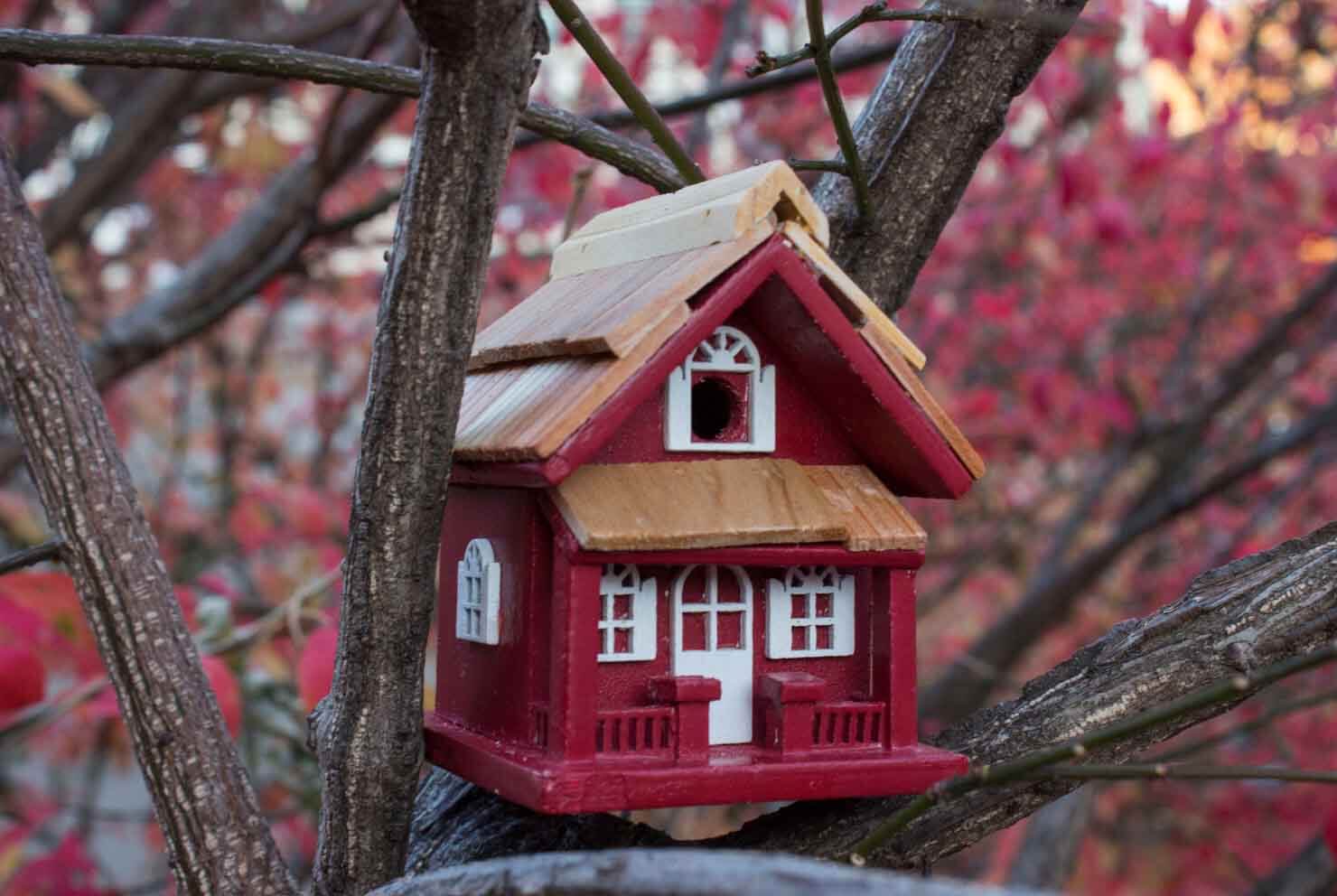How To Care for Birdhouses
Care For Birdhouses Right, And The Birds Will Return
Birdhouses aren’t just a fun garden accessory. They play a crucial role in helping preserve and protect bird species in your backyard. When it comes to how to care for birdhouses, there are specific steps to take that will ensure that they'll last through the seasons birds need them the most.
Caring for your birdhouse requires seasonal cleaning and close monitoring to ensure the proper maintenance of the house and the well-being of birds. Birdhouse maintenance also includes weatherproofing and preparing for possible predators and other unwelcome critters.
There’s much more to caring for a birdhouse than keeping it pretty for your garden. You are responsible for caring for the birds in your backyard, which requires a little more routine maintenance and care. So, in this article, I’ll cover all the basics of being a top-notch landlord for birds.

1. Keep a Close Eye on Your Birdhouse (but Not Too Close)
Birdhouse maintenance doesn’t require 24/7 surveillance, but doing a routine check-in every few days is good.
Monitoring the house isn’t just for observing your bird guests up close. It’s a great way to track how the house is holding up. This way, you can defend your birdhouse more easily from the elements and other animal intruders, allowing you to prevent damage to the tiny structure.
Be considerate of the birds, though. You’ll disturb them if you check in too often and are too close.
2. Clean Your Birdhouse
Avoid cleaning your birdhouse until you are sure the birds have finished using it.
There are three main steps in deep cleaning a birdhouse:
- Remove old nesting from the birdhouse. Empty the birdhouse of any nests that were left inside. After it’s completely free of old nesting, scrape out mud, bird droppings, or any other filth that’s hardened in harder-to-reach areas of the house.
- Disinfect the inside of the birdhouse. After emptying and scraping out the inside, scrub it with diluted chlorine bleach (one part bleach, nine parts water) until it’s clean. Use a toothbrush to scrub smaller corners, drainage holes, and crevices.
- Rinse and dry the birdhouse. After scrubbing with bleach, rinse the birdhouse thoroughly. Any lingering bleach or other chemicals can harm the birds, so taking time to rinse the inside thoroughly is crucial. After rinsing, pat dry before leaving the birdhouse in the sun to dry completely. Drying should take hours at the least and, on the safer side, a full day in direct sunlight.
Wear protective gloves and a mask when cleaning your birdhouse. There’s always the possibility of bees, wasp nests, mold, and bacteria inside the house - especially if your birdhouse was left unattended for an extended time.
If you want a more environmentally friendly cleaning solution, enzymatic cleaners are a great alternative to harsher solutions like bleach but are still effective at disinfecting.

Our article Do Bird Houses Need To Be Cleaned? addresses all you'll need to know as to the why's and how's when it comes to bird house cleaning.
3. Prepare the Birdhouse Depending on the Season
Clean your birdhouse in preparation for certain seasons because it can serve multiple purposes at different times. Certain bird species will use houses for certain things, whether it’s to stay safe from nasty weather or build a nest.
Preparing Your Birdhouse for the Spring Season
Spring marks the start of nesting season for multiple species of birds. While birds prepare for the season, you can also get ready by cleaning your birdhouse in time for their arrival.
Along with cleaning, take the time to ensure your birdhouse is still sturdy and safe for birds.
Here's a helpful YouTube video giving
birdhouse spring cleaning tips!
Preparing Your Birdhouse for the Winter Season
After the nesting season has ended, the best time to clean your birdhouse is during winter. how to care for birdhouses
However, if your birdhouse is a specific material (although the best ones are wood), snow and ice will damage it. It’s best to store away your birdhouse for winter if it’s any of the following:
- A clay house
- A gourd house
- An ornate or over-the-top decorated house
If your birdhouse is safe for winter, keep it out and ready for the upcoming season. Even though nesting season is over, birds still need warm and dry places to stay out of the snow, sleet, and ice that comes every winter.
4. Weatherproof Your Birdhouse
In addition to cleaning in anticipation of the seasons, weatherproofing is an essential part of birdhouse maintenance. The time taken to weatherproof is also the time to make any repairs the house may need after enduring all kinds of weather.
Making Sure Your Birdhouse Is Waterproof
Whether building a birdhouse or repairing it for the upcoming nesting season, you can’t go wrong with reapplying the proper paints and seals to waterproof your house.
Make sure they’re nontoxic and applicable to the material of your birdhouse. Toxic paint’s fumes and chemicals harm birds and can harm the environment.
Making Sure Your Birdhouse Is Winterproof
For harsher winter weather, transform your birdhouse into a roost box.
A roost box provides a warmer and safer environment for birds escaping icy temperatures. Turning your birdhouse into a roost box will also help it withstand snow and ice effectively.
Be sure to cover drainage holes, ventilation holes, and other small places where air or precipitation can get through.
5. Keep Your Birdhouse Safe From Predators (and Crashers)
Birds aren’t the only thing that uninvited predators endanger. Animals like cats, snakes, mice, raccoons, and squirrels can damage your birdhouse by gnawing holes into the house or ruining the exterior.
Some of these predators can also be unwelcome guests that take over the birdhouse and turn it into their home.
To keep unwanted animals from crashing at your birdhouse, destroying it, or raiding it, install a predator guard below the house.
According to the Cornell Lab of Ornithology, predator guards have a 6.7% success rate compared to birdhouses without protection. It puts both your birdhouse and its guests at a much lesser risk.

Looking for a new and improved birdhouse? Maybe something more decorative or functional? Then you'll want to fly over to this article of ours that recommends birdhouses that birds like.
How To Care For Birdhouses...Final Thoughts
Caring for a birdhouse is a big responsibility that requires lots of preparation and maintenance, but the joy of witnessing wildlife in your backyard makes the time and planning worth it. With diligent monitoring, timely cleaning, and some TLC when needed, your birdhouse can spruce up your garden while helping all kinds of birds.
Back To The TOP Of This How
To Care For Birdhouses Page

About the Author...
Richard Worden, a dedicated bird lover for over 20 years, I love to share my in-depth knowledge and passion for birds. Read more About Me and my expertise in this field.
- We Know Birds HOME ›
- Attracting Birds To Your Yard Or Garden ›
- How To Care for Birdhouses



